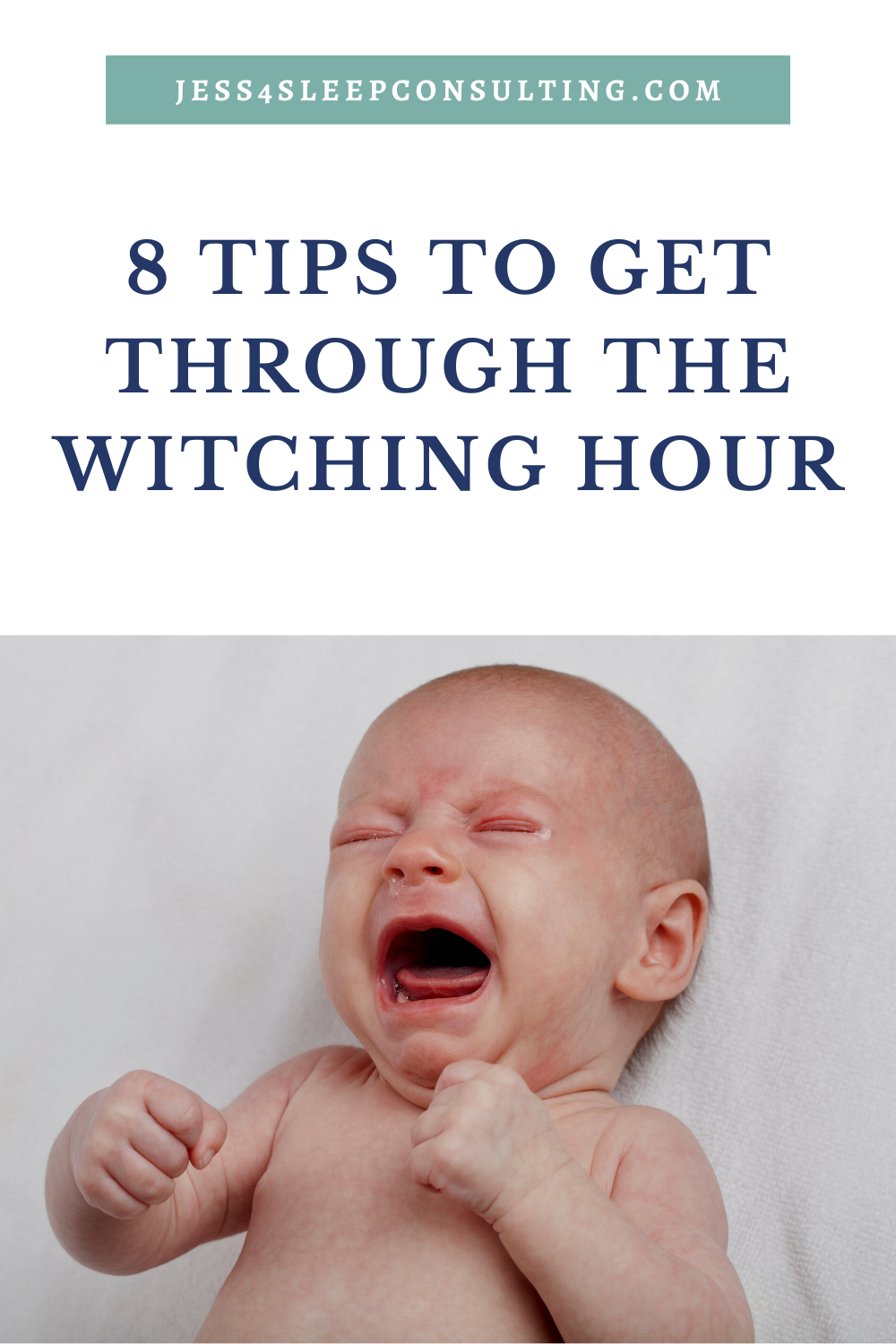8 Tips To Get Through The Witching Hour
Having a newborn is supposed to be this exciting new adventure but for most parents, it is exhausting! Not only is their sleep schedule all whacked, they cry and scream so loud your ears hurt! Sometimes it will even seem like nothing will or can help them calm down. Of course you are exhausted yourself and this screaming sound coming out of your baby’s mouth is not just difficult to hear because he/she is your precious baby but it is piercing! You start wondering, is this normal? Does my child have Colic? Is he/she ever going to calm down? Am I a terrible mom because I cannot soothe my own child?
Yes, this is normal
No, this does not necessary mean he/she has Colic
Yes, they will eventually calm down, it does not last forever
No, You ARE NOT a terrible mother!
Before getting into what we can do during this unbearable time, I am going to give an overview of what the witching hour is, the purple crying period, and Colic.
What Is The Witching Hour?
A time in the evening, usually between 5pm-11pm, when your baby seems to be unconsolable. You know they are not hungry, in need of a diaper change, too warm or cold and none of your soothing techniques seem to work.
Usually starts around 6-8 weeks of age and will eventually disappear once your baby gets older, usually around 3-4 months.
The amount of time this period lasts varies between babies. It can be short for some babies and others it can last all the way to 3-4 months.
This is normal and will not last forever. This is a good time to recruit help & support from significant others, family members and/or friends.
What Is The Purple Crying Period?
Do not worry, this does not mean a time when your baby cries so hard that they turn purple!
An acronym used to describe what is occurring during the “witching hour.”
It allows parents or caregivers to know that this is normal and there is an ending point, hence the term Period.
P: Peak of Crying
U: Unexpected
R: Resists Soothing
P: Pain-Like Face
L: Long Lasting
E: Evening
What to learn more about the Purple Crying Period? Click Here
This period of inconsolable crying can sometimes be thought as “colic” and as parents you become worried and fearful that something is wrong with your baby. However, this is all NORMAL and is a common developmental phase.
Is It Colic Or The Witching Hour?
It can be difficult to differentiate between babies who have Colic versus if they are just experiencing the Witching Hour. One way to determine the difference is that colicky babies tend to follow more of a specific pattern.
The 3 Rules of Colic Diagnosis:
Cries for 3 hours or more a day
For 3 or more days a week
For 3 or more weeks
Kidshealth.org explains what may occur during a Colic Spell:
Have high-pitched crying or screaming
Difficult to soothe
May develop a red face or pale skin around the mouth
Start pulling in the legs, stiffening the arms, arching the back, or clenching their fists
Tips To Get Through The Witching Hour:
Prevent Overtired-ness by Utilizing Awake Windows
Remember, babies at this age need lots of sleep, so we want to maximize their sleep during the day.
Newborn awake times are usually 60-90 minutes.
Look for sleepy cues and get them down before they become too fussy.
Utilize Harvey Karp’s Happiest Baby 5 S’s Soothing Routine
Swaddle
Side/Stomach (not for sleeping, just soothing!)
Shush
Swing
Suck
Give Baby a Warm Bath
A warm bath allows your baby to relax.
Try rubbing your baby's head and dabbing their face with a washcloth.
You can even add some lavender oil! According to this study , lavender oil reduces stress, crying and even promotes sleep for young babies!
Wear Your Baby
Allows your baby to be close to you AND you can be hands free to get things done around the house.
Recreate the Womb
Use a white noise machine/shushing sound: The consistent sound is comforting because it mimics the sound in the womb. The white noise machine also blocks out outside noises.
Constant movement: While in the womb, babies are constantly being moved around so movement such as rocking, bouncing, swaying can help soothe a fussy baby.
Dim the lights: In the womb babies are used to complete darkness and not much stimulation. Newborns can become overstimulated quite easily so try lowering the lights to decrease the stimulation.
Try Infant Massage
According to the International Association of Infant Massage, research shows that infant massage may support healthy growth, stimulate circulatory, digestive, hormonal and immune systems, learning and concentration.
Promotes bonding, secure attachment and development of trust and confidence.
And much, much more!
Nurse More
Nursing may be the only thing that soothes your baby at this time and when they are this young, it is okay!
Ask For Help!
Never fear to reach out for support from your significant other, family, friends, or any other outside support.
People want to help, so it is OKAY to take them up on this even if it is just so you can take a nice warm shower or bath!
Disclaimer: If you are ever concerned about your baby’s health & wellbeing, please seek out your Pediatrician!
Having a newborn can be overwhelming and exhausting but it does not always have to be this way! If you need support and a guiding hand, I have a package for you! You can also book a free 15-Minute Introductory Call for more information! And do not forget, this stage does not last forever!
Like, Comment, Or Pin For Later!
Hi! I’m Jessie. Your Infant & Toddler Sleep Consultant! Click Below To Learn More.
Follow Me On The ‘Gram















